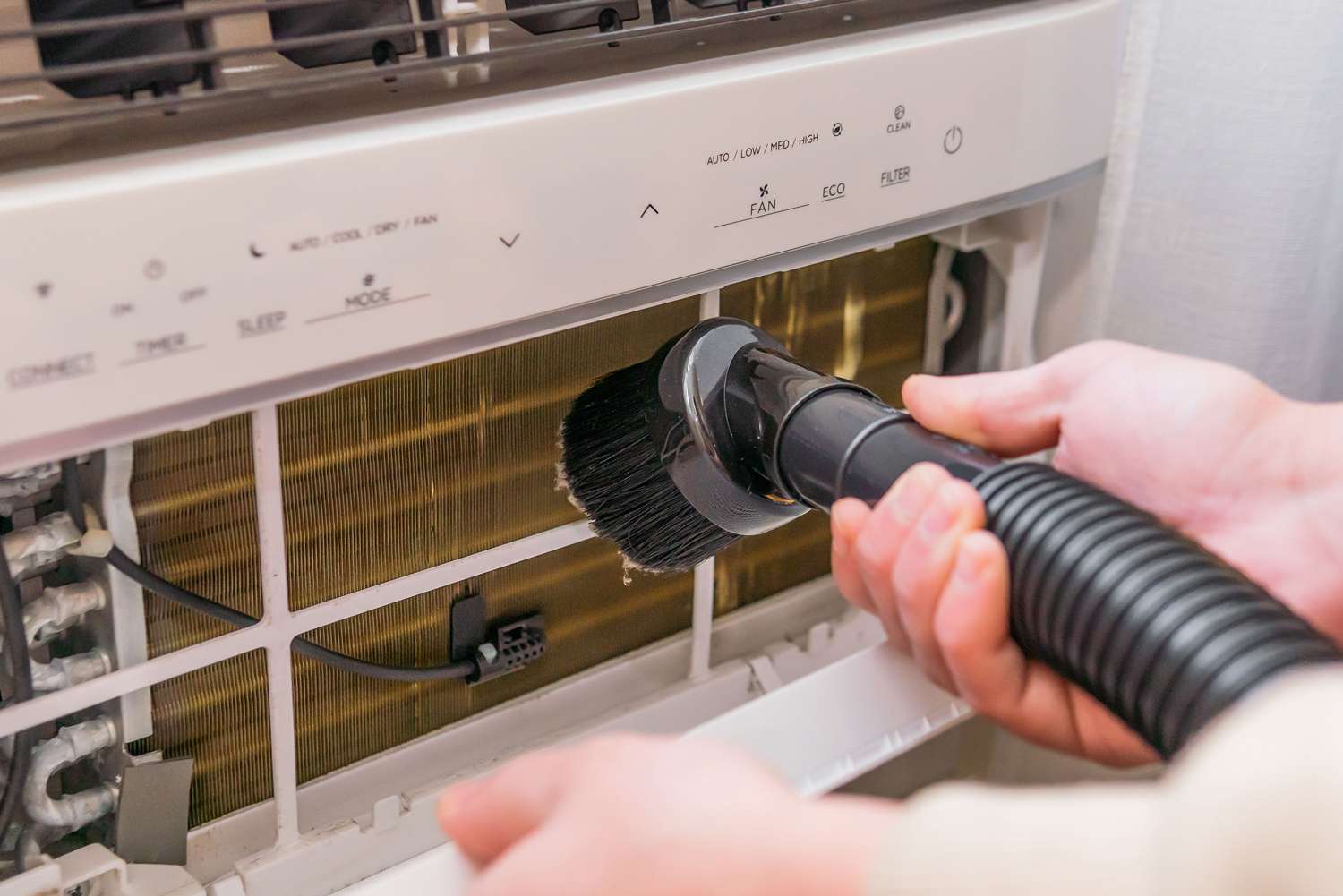Home>Home and Garden>The Surprising Reason Your House AC Is Blowing Hot Air


Home and Garden
The Surprising Reason Your House AC Is Blowing Hot Air
Published: January 15, 2024
Discover the surprising reason why your home AC is blowing hot air and find expert tips to keep your house cool and comfortable. Learn how to troubleshoot AC issues with our Home and Garden guide.
(Many of the links in this article redirect to a specific reviewed product. Your purchase of these products through affiliate links helps to generate commission for Noodls.com, at no extra cost. Learn more)
Table of Contents
Introduction
Picture this: it's the peak of summer, the sun is scorching, and you step into your home, eagerly anticipating the cool relief of your air conditioning. But to your dismay, instead of a refreshing burst of cold air, your AC is blowing out warm air. Frustrating, right? You're not alone. Many homeowners have experienced this perplexing issue, and the culprit is often a surprising one.
In this article, we'll delve into the unexpected reason behind your air conditioner's sudden betrayal. We'll explore the common problems that can lead to your AC blowing hot air, and we'll shine a spotlight on a crucial component that plays a pivotal role in keeping your home cool: refrigerant.
So, if you've ever found yourself sweating in your own living room while your AC futilely pumps out warm air, fear not. By the end of this article, you'll not only understand the root cause of this frustrating phenomenon but also be equipped with valuable insights to prevent it from happening in the future. Let's embark on a journey to uncover the mystery behind your house AC blowing hot air.
Read more: How To Make Hot Pockets In An Air Fryer
Common AC Problems
When your beloved air conditioner starts misbehaving, it can be a source of immense frustration. The sudden shift from cool comfort to warm air can leave you scratching your head, wondering what went wrong. Before we unravel the surprising reason behind your house AC blowing hot air, let's first explore some common problems that can plague air conditioning systems.
-
Dirty Air Filters: One of the most frequent culprits behind an AC blowing warm air is a clogged or dirty air filter. Over time, dust, dirt, and debris accumulate in the filter, obstructing the airflow and impeding the cooling process. Regularly replacing or cleaning the air filter is essential for maintaining optimal AC performance.
-
Thermostat Issues: A malfunctioning thermostat can wreak havoc on your AC's cooling abilities. Whether it's a faulty sensor, inaccurate temperature readings, or a misconfigured setting, thermostat problems can lead to erratic cooling patterns and, in some cases, the emission of warm air.
-
Refrigerant Leaks: Low refrigerant levels due to leaks in the system can cause your AC to blow out warm air. Refrigerant is the lifeblood of your air conditioner, responsible for absorbing heat from the indoor air and releasing it outside. When refrigerant levels are insufficient, the cooling process is compromised, resulting in inadequate cooling.
-
Electrical Issues: Faulty wiring, blown fuses, or damaged electrical components can disrupt the proper functioning of your air conditioner, leading to a variety of issues, including the emission of warm air. Electrical problems should be addressed promptly by a professional to prevent further damage to the system.
-
Dirty Condenser or Evaporator Coils: Over time, the condenser and evaporator coils in your AC can become coated with dirt and grime, hindering heat transfer and impeding the cooling process. Regular maintenance, including coil cleaning, is crucial for ensuring efficient cooling performance.
-
Lack of Maintenance: Neglecting regular maintenance and tune-ups for your air conditioning system can pave the way for a host of problems, including poor cooling performance and the dreaded phenomenon of hot air blowing from the vents.
Understanding these common AC problems sets the stage for unraveling the surprising reason behind your house AC blowing hot air. By addressing these issues proactively and seeking professional assistance when needed, you can ensure that your air conditioner operates at its full cooling potential, keeping you comfortable even in the sweltering heat of summer.
The Role of Refrigerant
Refrigerant serves as the lifeblood of your air conditioning system, playing a pivotal role in the cooling process that keeps your home comfortably chilled, especially during the scorching heat of summer. This specialized fluid circulates through the AC system, undergoing a continuous cycle of evaporation and condensation to facilitate the transfer of heat, ultimately resulting in the cooling of indoor air.
At the heart of the cooling process lies the fundamental principle of heat transfer. When your home's air becomes warm, the refrigerant, typically a chemical compound with excellent heat-absorbing properties, flows through the evaporator coil within the indoor unit of your air conditioner. As the warm indoor air passes over the coil, the refrigerant absorbs the heat, causing it to evaporate into a gas. This phase change allows the refrigerant to carry the absorbed heat away from your living space, leaving the air cooler and more comfortable.
The now-gaseous refrigerant travels to the outdoor unit of the AC system, where it undergoes a transformation back into a liquid state. This transition releases the absorbed heat into the external environment, allowing the refrigerant to revert to its original liquid form and prepare for another cycle of heat absorption.
In essence, refrigerant acts as a heat transfer medium, facilitating the extraction of warmth from your home's indoor air and releasing it outside. This continuous process of heat exchange enables your air conditioner to maintain a cool and pleasant indoor environment, shielding you from the oppressive heat of the outdoors.
Understanding the critical role of refrigerant in the cooling process underscores its significance in the overall functionality of your air conditioning system. Without an adequate level of refrigerant and the seamless operation of the refrigerant cycle, your AC's ability to effectively cool your home would be compromised, potentially leading to the unwelcome scenario of hot air blowing from the vents.
Now that we've gained insight into the indispensable role of refrigerant in the cooling process, let's delve into the repercussions of low refrigerant levels and the telltale signs that may indicate this underlying issue.
Effects of Low Refrigerant Levels
When your air conditioning system grapples with insufficient levels of refrigerant, the repercussions can reverberate throughout your home, impacting both the comfort of your indoor environment and the efficiency of your AC unit. Low refrigerant levels can trigger a cascade of adverse effects, undermining the cooling capacity of your air conditioner and compromising its ability to maintain a refreshing indoor atmosphere. Let's unravel the far-reaching consequences of low refrigerant levels:
-
Diminished Cooling Performance: Insufficient refrigerant hampers the heat absorption and release process essential for cooling your home. As a result, your air conditioner's ability to extract warmth from the indoor air is compromised, leading to inadequate cooling output. This can manifest as an unsettling scenario where your AC blows out warm or lukewarm air instead of the refreshing coolness you expect.
-
Increased Energy Consumption: In its valiant effort to compensate for the lack of refrigerant and achieve the desired cooling effect, your air conditioner may end up working overtime. This heightened workload translates into increased energy consumption, potentially causing a spike in your utility bills. The inefficiency stemming from low refrigerant levels not only diminishes your comfort but also burdens your wallet.
-
Strain on AC Components: Operating with insufficient refrigerant places undue strain on various components of your air conditioning system, particularly the compressor. The compressor, tasked with circulating the refrigerant and facilitating the heat exchange process, is forced to labor under suboptimal conditions. This prolonged strain can lead to premature wear and tear, hastening the need for repairs or even necessitating the replacement of costly components.
-
Icy Evaporator Coils: Low refrigerant levels can trigger an alarming phenomenon known as evaporator coil icing. When the refrigerant volume is inadequate, the evaporator coils may become excessively cold, causing moisture in the air to freeze on their surface. This ice buildup impedes the heat transfer process and further diminishes the AC's cooling capacity, exacerbating the issue of warm air blowing from the vents.
-
System Malfunctions: The strain imposed on the air conditioning system due to low refrigerant levels can pave the way for a myriad of malfunctions. From erratic cooling patterns and frequent cycling to complete system breakdowns, the consequences of insufficient refrigerant can manifest in a spectrum of operational issues, disrupting the comfort and functionality of your home's cooling system.
Understanding the multifaceted effects of low refrigerant levels underscores the critical importance of maintaining optimal refrigerant levels in your air conditioning system. By addressing and rectifying refrigerant-related issues in a timely manner, you can safeguard the efficiency, longevity, and cooling prowess of your AC, ensuring that it delivers the refreshing comfort you desire during the sweltering summer months.
Signs of Low Refrigerant
Identifying the telltale signs of low refrigerant levels in your air conditioning system is pivotal in addressing potential issues before they escalate into major operational setbacks. By recognizing these indicators early on, you can take proactive measures to rectify the underlying problem, ensuring that your AC operates at peak efficiency and delivers the cool comfort you expect. Let's delve into the unmistakable signs that may point to low refrigerant levels:
-
Diminished Cooling Performance: One of the most conspicuous indicators of low refrigerant levels is a noticeable decline in your air conditioner's cooling efficacy. If you find that your home isn't reaching the desired level of coolness despite the AC running continuously, it could be a red flag signaling insufficient refrigerant. The compromised heat absorption and release process resulting from low refrigerant levels can impede your AC's ability to maintain a refreshing indoor environment, leading to tepid or warm air emanating from the vents.
-
Inadequate Airflow: Low refrigerant levels can disrupt the airflow dynamics within your air conditioning system. As a consequence, you may observe reduced airflow from the vents, indicating an underlying issue that warrants prompt attention. If you notice weakened airflow coupled with lackluster cooling performance, it's advisable to have a professional HVAC technician inspect your system for potential refrigerant-related concerns.
-
Constant Cycling of the AC: A malfunctioning air conditioner struggling with low refrigerant levels may exhibit frequent cycling, where the unit turns on and off more frequently than usual. This erratic cycling pattern can stem from the system's attempt to compensate for the inadequate refrigerant by operating continuously in an effort to achieve the desired cooling effect. Not only does this place undue strain on the AC components, but it also signifies a potential refrigerant-related issue that requires resolution.
-
Audible Hissing or Bubbling Noises: When your air conditioner is plagued by low refrigerant levels, you may detect unusual hissing or bubbling noises emanating from the indoor or outdoor unit. These sounds can be indicative of refrigerant leaks within the system, prompting the need for immediate professional assessment and remediation to prevent further refrigerant loss and restore optimal functionality.
-
Ice Accumulation on the Evaporator Coil: In cases of severely low refrigerant levels, the evaporator coil in your air conditioning system may succumb to excessive icing due to the inadequate volume of refrigerant circulating within the system. This ice buildup on the evaporator coil impedes the heat transfer process, resulting in diminished cooling capacity and the potential emission of warm air from the vents.
Recognizing these unmistakable signs of low refrigerant levels empowers you to take proactive measures to address potential refrigerant-related issues, safeguarding the efficiency and functionality of your air conditioning system. If you observe any of these indicators, seeking professional HVAC assistance is essential to accurately diagnose the problem and implement the necessary measures to restore your AC's cooling prowess.
Preventing Low Refrigerant Levels
Preventing low refrigerant levels is paramount in maintaining the optimal functionality and cooling efficacy of your air conditioning system. By implementing proactive measures and adhering to diligent maintenance practices, you can mitigate the risk of refrigerant-related issues, ensuring that your AC operates at peak performance and delivers the refreshing coolness you expect. Let's explore effective strategies for preventing low refrigerant levels and preserving the integrity of your air conditioning system.
Schedule Regular Maintenance
Routine maintenance is a cornerstone of preventing low refrigerant levels in your air conditioner. Engaging the services of a qualified HVAC technician for scheduled maintenance inspections and tune-ups allows for the early detection of potential refrigerant leaks or insufficient refrigerant levels. During these comprehensive maintenance sessions, the technician can assess the refrigerant levels, inspect for leaks, and address any underlying issues, thereby preemptively averting the onset of low refrigerant-related complications.
Address Refrigerant Leaks Promptly
Promptly addressing any detected refrigerant leaks is essential for preventing low refrigerant levels. Even minor leaks can gradually deplete the refrigerant supply within your AC system, leading to diminished cooling performance and potential operational issues. Engage the expertise of a professional HVAC technician to conduct thorough leak detection and repair any identified leaks to safeguard the integrity of the refrigerant circuit and prevent the recurrence of low refrigerant levels.
Ensure Proper Refrigerant Charging
During maintenance or repair interventions, it's imperative to ensure that your air conditioning system undergoes proper refrigerant charging. This involves accurately measuring and replenishing the refrigerant levels in accordance with the manufacturer's specifications and industry best practices. Overcharging or undercharging the refrigerant can compromise the efficiency and longevity of your AC system, underscoring the importance of entrusting this task to a qualified professional.
Maintain Clean and Unobstructed Coils
Regularly maintaining clean and unobstructed condenser and evaporator coils in your air conditioning system is instrumental in preventing low refrigerant levels. Dirty or obstructed coils can impede the heat transfer process, leading to inefficiencies that strain the refrigerant circuit and compromise cooling performance. By adhering to a diligent coil cleaning regimen, you can optimize heat exchange, alleviate strain on the refrigerant, and mitigate the risk of low refrigerant levels.
Prioritize Professional HVAC Services
Engaging the expertise of professional HVAC services for all maintenance, repair, and diagnostic needs is crucial in preventing low refrigerant levels. Qualified technicians possess the knowledge, experience, and specialized tools to accurately assess, address, and prevent refrigerant-related issues. By entrusting the care of your air conditioning system to reputable HVAC professionals, you can uphold the integrity of the refrigerant circuit and fortify your AC against the detrimental effects of low refrigerant levels.
By embracing these proactive measures and prioritizing the care and maintenance of your air conditioning system, you can effectively prevent low refrigerant levels, safeguarding the cooling performance, efficiency, and longevity of your AC. Maintaining optimal refrigerant levels is pivotal in ensuring that your home remains a haven of refreshing coolness, shielding you from the sweltering heat with unwavering reliability and comfort.
Conclusion
In the realm of home comfort, the functionality of your air conditioning system holds paramount importance, especially during the blistering heat of summer. The perplexing scenario of your house AC blowing hot air can be attributed to a myriad of factors, but one surprising culprit often lurks beneath the surface: low refrigerant levels. This often-overlooked issue can wreak havoc on your AC's cooling performance, leading to discomfort and frustration.
As we've embarked on this journey to unravel the surprising reason behind your air conditioner's betrayal, we've delved into the critical role of refrigerant in the cooling process, the far-reaching effects of low refrigerant levels, and the unmistakable signs that may point to this underlying issue. Understanding the multifaceted repercussions of low refrigerant levels empowers you to recognize the red flags and take proactive measures to address potential refrigerant-related concerns before they escalate into major operational setbacks.
Moreover, we've explored effective strategies for preventing low refrigerant levels, emphasizing the pivotal role of routine maintenance, prompt leak detection and repair, accurate refrigerant charging, and diligent coil maintenance in safeguarding the integrity of your air conditioning system. By implementing these proactive measures and prioritizing the care and maintenance of your AC, you can fortify your system against the detrimental effects of low refrigerant levels, ensuring that it operates at peak performance and delivers the refreshing coolness you expect.
In essence, maintaining optimal refrigerant levels is not merely a matter of preserving the functionality of your air conditioning system; it's a cornerstone of upholding the comfort and well-being of your home environment. By nurturing your AC with attentive care and proactive maintenance, you can bask in the cool embrace of a reliably efficient cooling system, shielding you from the relentless heat and ensuring that your home remains a haven of refreshing comfort.
So, the next time your house AC threatens to betray you with a gust of warm air, remember the pivotal role of refrigerant and the proactive measures at your disposal to prevent low refrigerant levels. By staying attuned to the signs, engaging professional HVAC services, and prioritizing the care of your air conditioning system, you can thwart the unwelcome intrusion of warm air and revel in the consistent coolness that transforms your home into an oasis of comfort, even amidst the most scorching summer days.













